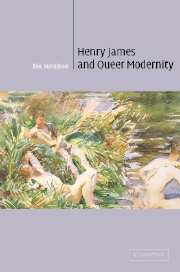Book contents
- Frontmatter
- Contents
- Acknowledgments
- List of abbreviations
- Introduction
- 1 Indiscreet anatomies and protogay aesthetes in Roderick Hudson and The Europeans
- 2 The elusive queerness of “queer comrades”: The Tragic Muse and “The Author of ‘Beltraffio’”
- 3 The Turn of the Screw, or: The Dispossessed Hearts of Little Gentlemen
- 4 Masculinity “changed and queer” in The Ambassadors
- 5 Gratifying “the eternal boy in us all”: Willa Cather, Henry James, and Oscar Wilde
- 6 “The other half is the man”: the queer modern triangle of Gertrude Stein, Ernest Hemingway, and Henry James
- Coda: “Nobody is alike Henry James.” Stein, James, and queer futurity
- Notes
- Bibliography
- Index
4 - Masculinity “changed and queer” in The Ambassadors
Published online by Cambridge University Press: 22 September 2009
- Frontmatter
- Contents
- Acknowledgments
- List of abbreviations
- Introduction
- 1 Indiscreet anatomies and protogay aesthetes in Roderick Hudson and The Europeans
- 2 The elusive queerness of “queer comrades”: The Tragic Muse and “The Author of ‘Beltraffio’”
- 3 The Turn of the Screw, or: The Dispossessed Hearts of Little Gentlemen
- 4 Masculinity “changed and queer” in The Ambassadors
- 5 Gratifying “the eternal boy in us all”: Willa Cather, Henry James, and Oscar Wilde
- 6 “The other half is the man”: the queer modern triangle of Gertrude Stein, Ernest Hemingway, and Henry James
- Coda: “Nobody is alike Henry James.” Stein, James, and queer futurity
- Notes
- Bibliography
- Index
Summary
Turning from The Turn of the Screw to The Ambassadors (1903) means re-turning to the mode of unsensational realism, the thematics of dissident adult masculinity adumbrated in The Europeans and The Tragic Muse, and the scene of American culture that suffuses the novel even though (or perhaps especially because) it is set entirely in Europe. By this stage in James's career as a fiction writer the general argument for an alternative masculinity had become very familiar, and its implication in homosexuality much clearer, if still necessarily opaque to the reader who failed or refused to peep behind his “verbal hedge” (or verbal hedging) for the “guilty secrets” it was presumed to harbor (CH 335). My contention throughout has been that James's consistent and ever more subtly emphatic writing against what seem to be primarily norms of gender identification and enactment cannot help but assail norms of sexuality as well. In a broad sense, this strand reaches an apogee of sorts in The Ambassadors.
Ironically, academic criticism is still catching up with a queer reading of Lambert Strether's yearnings that apparently dates from the late 1950s. As recently as 1997 Michiel W. Heyns has remarked on the oddity that despite James's well-known “strongly homoerotic” proclivities, Strether's outpouring to Little Bilham – “Live all you can ” – and the experiential regrets this imperative implies have not been “ascribed to an undeclared homosexual side” in the character.
- Type
- Chapter
- Information
- Henry James and Queer Modernity , pp. 102 - 133Publisher: Cambridge University PressPrint publication year: 2003
- 1
- Cited by



